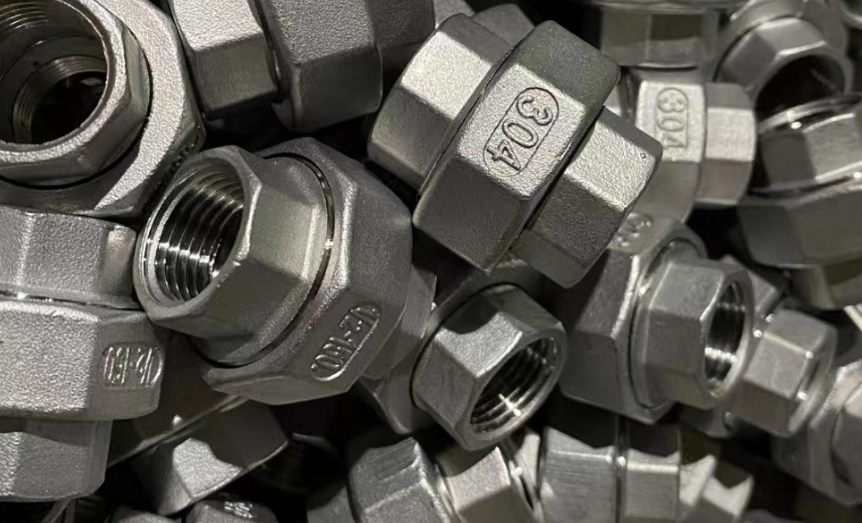Rustproofing is a crucial aspect of materials science, particularly when dealing with metals exposed to harsh environments. 304 Stainless Steel, being a popular choice for its corrosion resistance, often raises the question – Is 304 Stainless Steel Rustproof? This article delves into the intricacies of 304 stainless steel, exploring its rust-resistant properties, the conditions that can affect them, and the limits of its durability.

Is 304 Stainless Steel Rustproof?
304 Stainless Steel Composition and Properties:
304 stainless steel is a type of austenitic steel that contains a minimum of 18% chromium and 8% nickel. This composition gives it its characteristic corrosion resistance, making it suitable for a wide range of applications.
Chromium forms a thin, invisible, and adherent oxide layer on the surface of the steel, known as the passivation layer. This layer acts as a barrier, protecting the steel from further corrosion by preventing the ingress of oxygen and other corrosive agents.
Nickel, on the other hand, enhances the mechanical properties of the steel, improving its ductility, toughness, and weldability. It also stabilizes the austenitic structure, preventing transformation to other phases that could affect the corrosion resistance.
Rust Resistance of 304 Stainless Steel:
The passivation layer on 304 stainless steel is what gives it its rust-resistant properties. In most environments, this layer is stable and effective at preventing corrosion. However, there are certain conditions that can affect its integrity, leading to corrosion and, ultimately, rust formation.
Factors That Can Affect Rust Resistance:
- Chloride Exposure: Chloride ions, commonly found in saltwater, salt spray, or de-icing salts, can penetrate the passivation layer and initiate corrosion. Once chloride ions are trapped within the oxide layer, they can form soluble chloride complexes that can diffuse through the layer, attacking the underlying metal and causing pitting corrosion.
- High Temperature: Elevated temperatures can affect the stability of the passivation layer, reducing its protective properties. This is particularly true in oxidizing environments, where high temperatures can accelerate the formation of scale or other corrosive products.
- Mechanical Abrasion: Physical abrasion or scratching of the surface can remove the passivation layer, exposing the underlying metal to corrosion. This is often a concern in applications where the steel is subject to frequent contact or abrasion, such as in processing equipment or components exposed to abrasive media.
- Chemical Attack: Certain chemicals, such as acids or alkalis, can attack the passivation layer, removing its protective properties. This can lead to corrosion and rust formation, especially if the exposure is prolonged or intense.
Maintaining Rust Resistance of 304 Stainless Steel:
To maintain the rust-resistant properties of 304 stainless steel, it is essential to:
- Keep the surface clean and free of contaminants that can affect the passivation layer.
- Avoid exposure to chloride-containing environments, especially saltwater or salt spray.
- Control temperatures, especially in oxidizing environments, to prevent scale formation or other corrosive processes.
- Minimize mechanical abrasion by using appropriate materials and designs to prevent scratching or abrasion of the surface.
- Use appropriate chemicals and cleaning agents that are compatible with the steel and won’t damage the passivation layer.
Conclusion
304 stainless steel, with its chromium and nickel composition, offers excellent rust-resistant properties in most environments. However, it is not truly rustproof, as certain conditions can affect the integrity of the passivation layer and lead to corrosion and rust formation. Understanding these conditions and taking appropriate measures to mitigate them is crucial in maintaining the rust resistance of 304 stainless steel.
Thank you for reading our article and we hope it can help you to find the answer to the question – Is 304 Stainless Steel Rustproof? If you are looking for 304 stainless steel suppliers online now, we would advise you to contact Sino Stainless Steel.
As a leading supplier of stainless steel products across the world, Sino Stainless Steel provides customers with high-quality stainless steel pipes, stainless steel strips, stainless steel coils, stainless steel plates, stainless steel sheets, stainless steel bars, and stainless steel tubes at an extremely competitive price.
 :+86-13012867759
:+86-13012867759  :export86@sino-stainless-steel.com
:export86@sino-stainless-steel.com
experience and quality thank you.stratpak
experience and quality thank you.strappedincarseatsafety
experience and quality thank you.strongarmcleaningny
experience and quality thank you.suddenimpactli
experience and quality thank you.paprikalongbridge
experience and quality thank you.doktervanhecke
experience and quality thank you.painoutband
experience and quality thank you.the-complete-package
experience and quality thank you.sungoldabrasives
experience and quality thank you.tcilandscaping
experience and quality thank you.surfacingsystems
experience and quality thank you.techniquesmadeeasydrivingschool
experience and quality thank you.thebowmanfirm
experience and quality thank you.testingmechanics
experience and quality thank you.surfacingsystems
experience and quality thank you.theboulders
experience and quality thank you.thecabinetwarehouse
experience and quality thank you.straightlinecustomconstruction
experience and quality thank you.thespongecompany
experience and quality thank you.pallongislandlacrosse
experience and quality thank you.profondacreation
experience and quality thank you.sols-egypt
experience and quality thank you.ppattorneys
experience and quality thank you.predicate
experience and quality thank you.therefore
experience and quality thank you.tristatepropertybrokers
experience and quality thank you.unitypavers
experience and quality thank you.lckcabinetryny
experience and quality thank you.nesponge
I’m curious tto find out what blg pplatform yyou aree using?
I’m experiencing some small secrity problems with myy
latesat site and I’d like to ffind something
more safeguarded. Do you have anny suggestions?